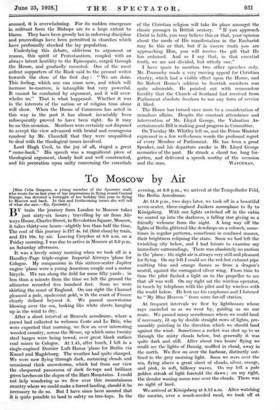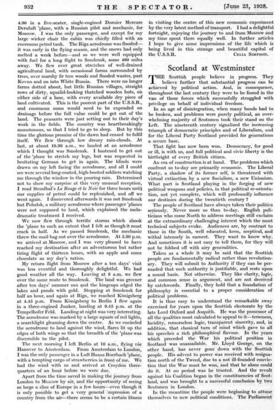To Moscow by Air
[Miss Celia Simpson, a young member of the Spectator staff, who wrote for us last year of her impressions in flying round Central Europe, has devoted a fortnight of her holiday this year to flying to Moscow and back. In this and forthcoming issues she will tell of what she saw.—En. Spectator.] BY train the journey from London to Moscow takes just sixty-six hours ; travelling by air from Air- ways House, Charles Street, to Revolution Square, Moscow, it takes thirty-one hours—slightly less than half the time. The cost of this journey is £17 4s. 1d. (first class) by train, and £24 10s. by air. Leaving Croydon at 8.0 a.m. on a Friday morning, I was due to arrive in Moscow at 3.0 p.m. on Saturday afternoon.
It was a lovely sunny morning when we took off in a Handley-Page triple-engine Imperial Airways 'plane for Cologne. My companions' in this sixteen-seater Jupiter engine 'plane were a young American couple and a motor bicycle. We ran along the field for some fifty yards ; in less than a minute from the time we left the ground the altimeter recorded five hundred feet. Soon we were skirting the coast of England. On our right the Channel gleamed a pale, opalescent gold, with the coast of France clearly defined beyond it. - We passed snowstorms blowing over the sea, looking like white sheets hanging up in the wind to dry.
After a short interval at Brussels aerodrome, where a crowd had collected to welcome Coste and Le Brix, who were expected that morning, we flew on over interesting wooded country, across the Meuse, up which some twenty steel barges were being towed, over great black surface coal mines to Cologne. At 1.45, after lunch, I left in a single-engined Dornier Luft Hansa 'plane for Berlin via Kassel and Magdeburg. The weather had quite changed. We were now flying through dark, menacing clouds and occasional thick snowstorms, which hid from our view the chequered panorama of dark fir-tops and brilliant green larches on the slopes of the Harz Mountains. I could not help wondering as we flew over this mountainous country where we could make a forced landing, should it be necessary to do so. But I have since been assured that it is quite possible to land in safety on tree-tops. In the evening, at 6.0 p.m., we arrived at the Tempelhofer Feld, the Berlin Aerodrome.
At 11.0 p.m., two days later, we took off in a beautiful seven-seater, three-engined Junkers monoplane to fly to Konigsberg. With our lights switched off in the cabin we soared up into the darkness, a falling star giving us a friendly welcome from the night. A long way off the lights of Berlin glittered like dewdrops on a cobweb, some- times in regular patterns, sometimes in confused masses, their brightness eclipsing the stars. Soon we had left the twinkling city below, and I had leisure to examine my immediate surroundings. There was absolutely no motion' in the 'plane : the night air is always very still and pleasant for flying. On my left I could see the red-hot exhaust pipe emitting blue and orange flames as from a dragon's nostril, against the corrugated silver wing. From time to time the pilot flashed a light on to the propeller to see that all was well. On my right sat the wireless operator, in touch by telephone with the pilot and by wireless with the world below. He lent me his earphones and I listened to " My Blue Heaven " from some far-off station.
At frequent intervals we flew by lighthouses whose rays encircled us as we went by, guiding us on our route. We passed many aerodromes where we could land if necessary, lit up by double straight rows of lights, pre- sumably pointing in the direction which we should land against the wind. Sometimes a rocket was shot up to us through the misty clouds below, but generally it was quite dark and still. After about two hours' flying we could see the lights of Danzig, muffled in cloud, away in the north. We flew on over the harbour, distinctly out- lined in the grey morning light. Soon we were over the sea, flying above a great sheet of clouds, silver, orange, and pink, in soft, billowy waves. On my left a pale golden streak of light foretold the dawn ; on my right, the slender waning moon rose over the clouds. There was no sight of land.
We arrived at Konigsberg at 8.15 a.m. After watching the sunrise, over a much-needed meal, we took off at 4.80 in a five-seater, single-engined Dornier Mereure Deruluft 'plane, with a Russian pilot and mechanic, for Moscow. I was the only passenger, and except • for. my large wicker chair the cabin was chiefly filled with an enormous petrol tank. The Riga aerodrome was flooded— it was early in the flying season, and the snows had only melted a week before—and so we were well equipped with fuel for a long flight to Smolensk, some 460 miles away. We flew over great stretches of well-drained agricultural land, with occasional farms surrounded by trees, over marshy fir tree woods and flooded wastes,-past Kovno and on into White Russia. There were no longer farms dotted about, but little Russian villages, straight rows of dirty, squalid-looking thatched wooden huts, on either side of a lane, with every available dry piece of land cultivated. This is the poorest part of the U.S.S.R., and enormous . sums would need to be expended on drainage before the full value could be got out of the land. The peasants were just setting out to their day's work in the fields. The country was heartbreakingly monotonous, so that I tried to go to sleep. But by this time the glorious promise of the dawn had ceased to fulfil itself. We flew - through low dreary rain-clouds. At last, at about 10.30 a.m., we landed at an aerodrome which I thought was Smolensk. I hastened to get out of the 'plane to stretch my legs, but was requested in hesitating German to get in again. The blinds were drawn on my left facing the aerodrome, and all I could see were several long-coated, high-booted soldiers watching me through the window in the pouring rain. Determined not to show my surprise at this very unusual reception; I read Stendhal's Le Rouge et le Noir for three hours until our supplies -of petrol could be replenished, and off we went again.' I discovered afterwards it was not Smolensk but Polodsk, a military aerodrome where passenger 'planes were not supposed to land, which explained the melo- dramatic treatment I received.
We now flew through terrific storms which shook the 'plane to such an extent that I felt as though it must crack in half. As we passed Smolensk, the mechanic threw the mail bag out over the aerodrome. At 5.30 p.m. we arrived at Moscow, and I was very pleased to have reached my destination after an adventurous but rather tiring flight of thirteen hours, with an apple and some chocolate as my day's ration.
My return flight from Moscow after a ten days' visit was less eventful and thoroughly delightful. We had good weather all the way. Leaving at 8 a.m. we flew over the same route to Smolensk. The land was greener after ten days' summer sun and the kingcups edged the lakes and ponds with gold. Stopping at Smolensk for half an hour, and again at Riga, we reached Konigsberg at 4.45 p.m. From Konigsberg to Berlin I flew again in a three-engined Junker, landing at 9.45 p.m. at the Tempelhofer Feld. Landing at night was very interesting. The aerodrome was marked by a large square of red lights, a searchlight gleaming down the centre. As' we encircled the aerodrome to land against the wind, flares lit up the edges of both wings so that the breadth of the 'plane was discernible to the pilot.
The next morning I left Berlin at 10 a.m., flying via Hanover to Ainsterdam. From Amsterdam to London, I was the only passenger in a Luft Hansa.Roerbach splane,- with a tempting cargo of strawberries in front of me.- 'We. had the wind with us and. arrived at CroYdon time-- quarters of an hour before we were due. ' Apart from the time saved in making tire fourney from London to Moscow by air, and the opportunity of seeing so large a slice of Europe in a few hourseven though it is only possible to get a very general impression of a country from the air—there seems to be a certain fitness in visiting the centre of this new economic experiment by the very lateSt method of transport. I had a delightful fortnight, enjoying the journey to and froin MoScow and my time spent there equally well. In further articles I hope to giVe Some impreSsions of the life which is being lived in this strange and beautiful capital of































 Previous page
Previous page